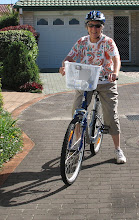He signed up for an adventure and died on the Western Front battlefields of the Somme, in France, on July 9 1918, just four months before the guns of World War I fell silent. His body was never found.

Here he is pictured just before embarking for Europe. The boy is my father James.
It is estimated that 59,000 Australians died during the war. Of the 330,000 of my nation's youth who were mobilized for service it is thought 152,000 were injured. That adds up to 64 per cent who were seriously affected.
The entire Australian population of the time was just five million.
This week the world is commemorating the 90th anniversary of the official conclusion of the horrors of that war.
Generations later, to the very many families so intimately involved, those horrors remain in memory.
Robert Hamilton Saville - Bob to adults in his family and 'Bobo' to his nieces and nephews - was the apple of our family's collective eye. Indeed, my father named his only son (and my brother) after him.
Five years after his death his mother Jessie described her existence as 'a living agony'. She said this in a letter to the Australia armed forces pleading for information about her son.
The letters she wrote over many years, always seeking news of Bob, sketch in graphic fashion the horrors faced by loved ones because of war.

This is Robert Hamilton Saville's mother Jessie in happier times.
And the letter below is one of many similar ones which my brother Bob recently discovered in the records of the Australian War Memorial in Canberra.

Actually, so far as Bob was concerned, the army tried hard to get information for Jessie, including interviewing soldiers in Bob's unit.
There was so much confusion on those battlefields, with shocking battles being fought time and again over the one small piece of ground. Bodies were often blown to pieces and were buried where they lay, by falling earth and rocks.
One soldier recounted how he saw Bobbie Saville 'killed near me by bomb or bullet at Merris about midnight during a hop over just before reaching our objective. He died instantly.'
Another said that Bob had been buried where he lay, by members of his own platoon. 'The ground was held' he added, in seeming satisfaction.
A Lance Corporal testified that he had also seen Bob killed - 'with a bomb'. 'On the way back I examined Saville and found him quite dead. He was buried later on. I knew him quite well.'
A Private said he had seen Bob killed outright by machine gun fire, and had seen him lying dead on the ground soon afterwards.
An officer added: 'According to informant Saville was well thought of by his mates.'
Jessie had nine children all together, including three sons and a daughter who all died within a year of birth. Obviously she prized every one of them.
But it seemed that her gravest sorrow was not knowing exactly what had happened to Bob, or where he lay. On the other hand, she may never have received these eye witness accounts. I wouldn't know.

During World War I Jessie and the family also worried about Bob's brother Herbert Nathaniel (above) who made it the the end of the war in the same battalion. This portrait depicts him five months after the official ending.
Some time afterwards Jessie also wrote letters seeking to know what had happened to her brother William, who fought in Europe as well. Records tell us that he returned, but I understand that Jessie herself never find out.

This is a form Bob filled in to enlist. The crossings-out and alterations are changes made whenever Jessie contacted the army from a new address - she moved around a lot.
Jessie never wanted Robert Hamilton to go to war, and did what she could to prevent it happening.
When Bob was 18 years and four months old and his mother was away in Queensland he enlisted without parental consent. Jessie found out and wrote to the army saying she absolutely refused her son permission to join up.
Bob had been training for two months and the army was obliged to discharge him 'at his mother's request'. By this time the Gallipoli campaign was in full swing.
It seems Bob was determined to serve and finally both his parents agreed to him joining up again only four months after he was released.
His new enlistment form stated that Bob was but 5 feet 4 inches tall, weighed 130 pounds, with a 32 inch chest expanding to 35.5 inches. He had a 'fresh' complexion, brown eyes and light brown hair.
Bob embarked on the 'Wiltshire' among reinforcements for France via England on August 22 1916. By this time the 4th Battalion had moved on from Turkey.
Herb Saville also joined the 4th Battalion in France and like so many of their mates the brothers protected those at home from much of the horror they were facing. This was especially the case, naturally, where children were involved.
On March 22 1917 Herb wrote a letter to his niece Edie who was nine at the time. It's a lovely, gentle letter.


Edie was one of the sisters of my father Jim who was then aged eight. Here they are pictured around the time.

Edie also received a letter from Uncle Bobo:

Bob spent some time in hospital in France and England with scabies and dermatitis (no wonder in the conditions) and also served as a batman to Captain R.A. McAlpine MC at the training school at Aldershot in England before being shipped back to the Western Front.
It is such a waste that fine people are drawn into such horrors. The sooner wars of all varieties are ended forever, the better.
How do you feel about war and the effect they have on families? Do you have similar stories?







